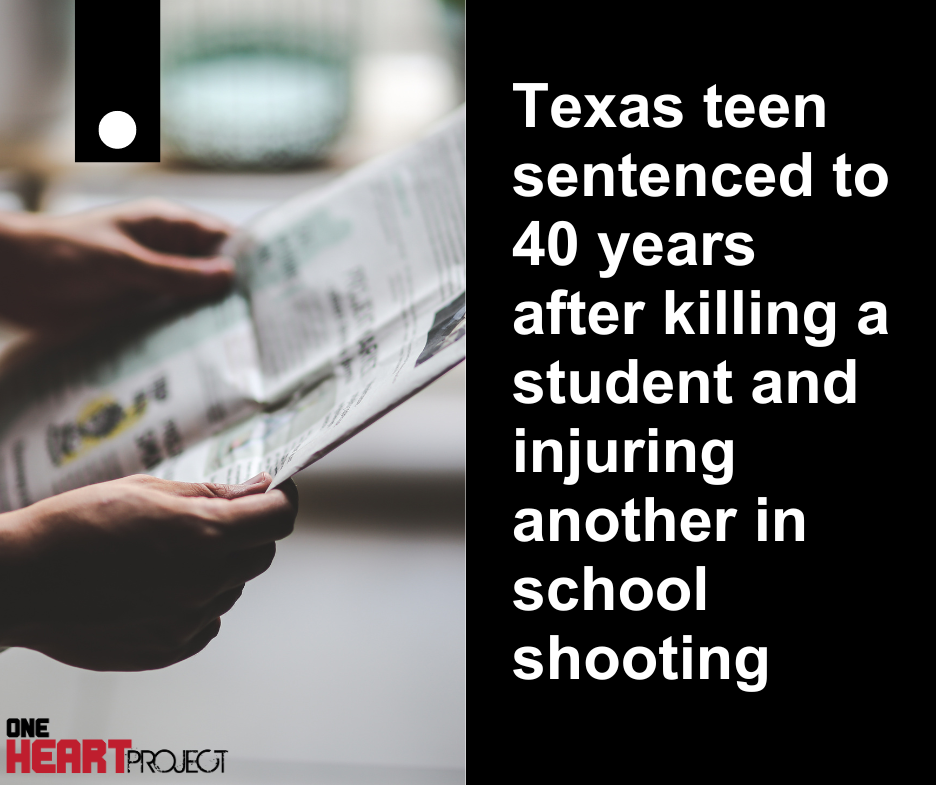
The above headline ran in national news services last month, telling the story of a 16-year-old who was sentenced to 40 years in prison for fatally shooting a student and injuring another at a Dallas-area school on March 20th of this year. The sentenced teen was 15 at the time of the shooting.
This has become an all too familiar tragic story in our culture today.
It is tragic in that a young man’s life – full of promise – was taken that day.
It’s also tragic in that another young man, also with a life filled with promise, will spend the next 40 years in prison, facing the stark realization of what he has done.
Sometimes, for public safety reasons, the juvenile courts must make difficult decisions that dramatically affect young people and profoundly alter their future. This is often a necessity to ensure greater safety in our communities, and in this case, our schools.
Yet, in this case, as with so many others, the greater tragedy is that it didn’t have to happen.
The true heartbreak of this story is that no one got to this youth before he pulled the trigger. Because of that two futures were lost.
We have learned that so many youth that end up in situations like this come from very challenging circumstances. They don’t exit the womb with a desire to be involved in criminal behavior. Rather, most come from single-parent homes, live below or near the poverty level, are food-insecure, and have a close relative in the adult prison system. Often, they lack sound guidance, positive influence, and the basic tools for living.
They would like a better life, but they don’t see a pathway to get there. They feel they have already hit their heads on the proverbial ceiling and there is no hope for anything beyond their current existence.
While this does not justify murder, it informs us as a society of how we might address these issues to provide more senseless loss of life. And how we might instead focus on providing the framework for a productive future for youth that might otherwise head down this destructive road.
To create this kind of change requires both intervention and prevention. To be successful in each requires people that are willing to stand in the opportunity gap for these youth – a veritable “village of elders” that is willing to impart wisdom, give direction, model character, and express compassion.
The One Heart Project’s mission is to help gather that village so that these youth can be equipped with the skills and tools they need to navigate life successfully, and to surround them with a network of healthy adults that will coach them along the way.
As we have witnessed over the past several years, it works.
It works because great people are willing to step out of their comfort zones and be the ones who make the difference. Simply by showing up, they assign value to a youth and help reshape his/her sense of identity. Once hope is birthed, look out.
Our team and our volunteers have found that there is no greater fulfillment in life than helping see that hope birthed and a young person’s life transformed.
It’s happening every day in Texas and in other states.
Hundreds of youth are now on a better pathway; one where they will never have to experience tragedies like those of March 20, but rather have the opportunity to experience a hope and a future and realize their own unique individual promise.
If you are reading this and you are in one of our service areas, I am asking you to consider becoming a volunteer mentor to one of our remarkable youth. As a mentor, you can listen, encourage, and show our youth the great potential they have. You can be the reason they have hope and believe more is possible for them.
When you get involved, you can help ensure that the tragic outcomes like the headline above never happen.
